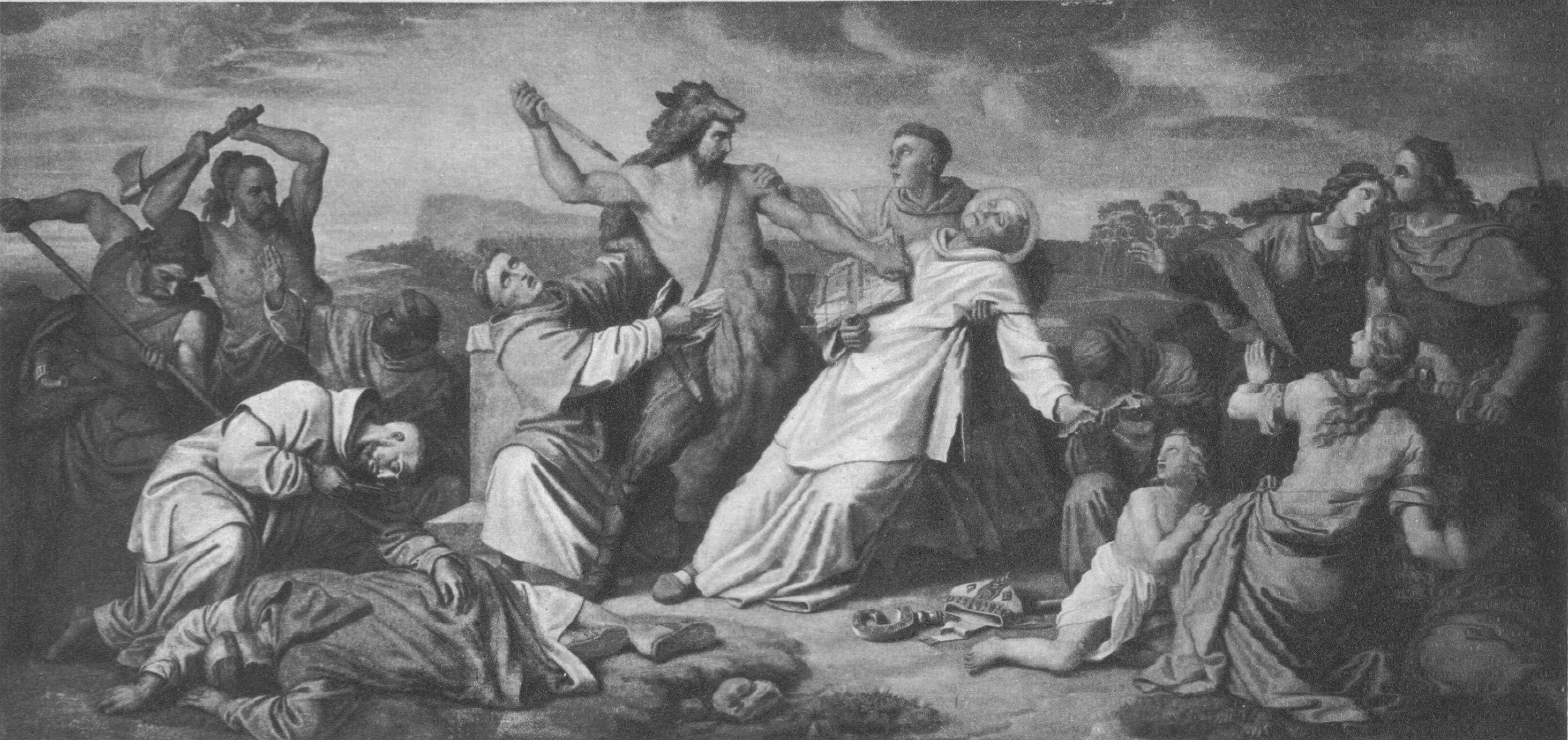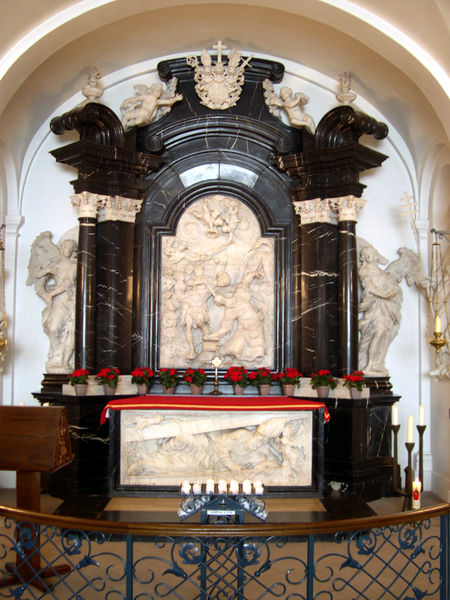
-martyrdom of St Boniface. Please click on the image for greater detail.
Paganism in Europe often took the form of Animism. Animism is a form of idolatry which sees spirits in nature inhabiting the form of trees, rocks, and other natural phenomenon. It is a classic and well-worn, even today, human error to crave or worship the creature and to foolishly disavow and neglect the Creator. We get our German traditions of the Christmas tree and even Christmas wreaths, indirectly, from this Animism. Nordic and Germanic pagan tribes would often bring greens into their lodge houses as Winter began, and bedeck wagon wheels, unnecessary in Winter, with greens and garland, and place candles on the now horizontal wheels for light during the long, cold Winter nights ahead.
As this year marks the quincentennial of the Luther’s revolution, it is fitting to reflect on where Christianity first or came again to Germany before 1517. Boniface, known as the apostle of the Germans, was an English Benedictine monk who gave up being elected abbot to devote his life to the conversion of the Germanic tribes. Two characteristics stand out: his Christian orthodoxy and his fidelity to the pope of Rome.
How absolutely necessary this orthodoxy and fidelity were is borne out by the conditions Boniface found on his first missionary journey in 719 AD at the request of Pope Gregory II. Paganism was a way of life. What Christianity he did find had either lapsed into paganism or was mixed with error. The clergy were mainly responsible for these latter conditions since they were in many instances uneducated, lax and questionably obedient to their bishops. In particular instances their very ordinations were questionable.
These are the conditions that Boniface was to report in 722 on his first return visit to Rome. The Holy Father instructed him to reform the German Church. The pope sent letters of recommendation to religious and civil leaders. Boniface later admitted that his work would have been unsuccessful, from a human viewpoint, without a letter of safe-conduct from Charles Martel, the powerful Frankish ruler, grandfather of Charlemagne. Boniface was finally made a regional bishop and authorized to organize the whole German Church. He was eminently successful.
In the Frankish kingdom, he met great problems because of lay interference in bishops’ elections, the worldliness of the clergy and lack of papal control.
During a final mission to the Frisians, Boniface and 53 companions were massacred while he was preparing converts for confirmation.
In order to restore the Germanic Church to its fidelity to Rome and to convert the pagans, Boniface had been guided by two principles. The first was to restore the obedience of the clergy to their bishops in union with the pope of Rome. The second was the establishment of many houses of prayer which took the form of Benedictine monasteries. A great number of Anglo-Saxon monks and nuns followed him to the continent, where he introduced the Benedictine nuns to the active apostolate of education.
“Sometimes you have to call out nonsense for what it is. In an age of trigger warnings and safe spaces, where “I feel” exercises a sacred and undisputed hegemony over public discourse, people take it for granted that even the silliest ideas are valuable and need to be respected. In reality, however, that is totally untrue. While it is true that we should never use the truth as a bludgeon with which to beat people over the head, it is nevertheless the case that some ideas have to be treated with the disdain they rightfully deserve.
St. Boniface is a great model for us to look to in this regard. He lived in a time when pagan superstition was rampant (even among the recently Christianized peoples of northern Europe) and people were afraid of all sorts of silly things. A famous instance of this was the Oak of Geismar, which locals venerated as sacred to Thor. Instead of making a well-reasoned case for why the villagers might possibly consider rethinking their fear of a tree, Boniface simply chopped it down before their very eyes. His unsmitten person made a more eloquent case than words ever could. It is true that this was only one moment in the life of a bishop who did much learned teaching and preaching, and we should not take away from this episode that rational discourse has no place when confronting even the most ridiculous opinions. Still, there are times when reason is of no avail. At that point, all that remains is personal witness.
As absurd as certain ideas may be, their absurdity does not make them any less dangerous. Boniface was eventually murdered by hostile pagans, who were still clinging to beliefs Boniface had forcefully shown to be complete nonsense. Similarly, an increasing number of people in our culture suffer various forms of persecution for witnessing to basic truths about human nature and flourishing. Whereas the most outlandish opinions are widely acclaimed, those who appeal to common sense are vilified as narrow-minded bigots. Despite overwhelming opposition, Boniface was convinced that the light of truth would pierce the darkness of error, and time proved him wise.
May we, like St. Boniface, never weary of witnessing to the truth in a world that loves falsehood, confident that, in all our apostolic endeavors, it is God who makes them prosper cf. 1 Corinthians 3:6-8. St. Boniface, pray for us.”
“Let us be steadfast in what is right and prepare our souls for judgment. Let us await God’s powerful aid and say to Him, “O Lord, You have been our refuge in all generations.”
Let us trust Him Who places this call upon us.”
– St Boniface
“Can there be a more fitting pursuit in youth or a more valuable possession in old age than a knowledge of Holy Scripture? In the midst of storms it will preserve you from the dangers of shipwreck and guide you to the shore of an enchanting paradise and the ever-lasting bliss of the angels.”
-St. Boniface
Prayer:
Glorious St Boniface, like you, may I have the courage to speak the Gospel to those who do not yet believe.
Amen.

-crypt of St Boniface, Fulda Cathedral
May the Martyr Saint Boniface be our advocate, O Lord,
that we may firmly hold the faith
he taught with his lips and sealed in his blood
and confidently profess it by our deeds.
Through our Lord Jesus Christ, your Son,
Who lives and reigns with You in the unity
of the Holy Spirit,
one God, for ever and ever.
Amen.
Love,
Matthew


